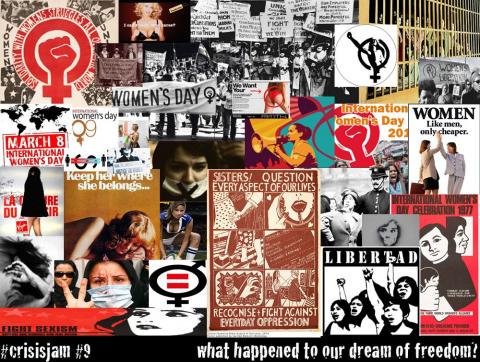Towards a more equal society - An introduction to CrisisJam's International Women's Day special

When Constance Markievicz became the first woman elected to parliament it was hailed as a great victory for Irish women. While the women themselves were jubilant the irony was not lost on them as the feminist paper the Irish Citizen remarked, "Under the new dispensation the majority sex in Ireland has secured one representative. This is the measure of our boasted sex equality."
Fast forward 90 years or so and one would expect to find a vastly different scenario in Dáil Eireann. Yet when the 31st Dáil convened on Wednesday last only 25, or 15%, of the 166 faces were female. Since 1918, women have occupied just 244 of 4,618 Dáil seats.
And when questions were asked about the striking under-representation of women in the new cabinet, an instant rebuttal was that we had the three Marys last time around and look how bad a job they did. The implication being that female members of the current government should be somehow punished because women in previous governments performed badly. Following the logic of this argument then, Michael Noonan should not be Minister for Finance because his predecessor Brian Lenihan, also a man, was twice voted the worst Finance Minister in Europe.
In a recent interview with Miriam Cotton, UCD Professor of Equality Studies Kathleen Lynch observed that Ireland has an extremely chauvinist culture. If a man dissents from the consensus in the media he is abused for his ideas, but for a woman this abuse is sexualised. In commentary on social media, a man may be attacked for his opinions and called an eejit or an idiot, but when a woman is criticised the abuse often becomes gendrified ie. she is not just a thick, she's a 'stupid woman' or, as Kathleen Lynch was called on Twitter, a 'silly bitch'. This is not confined solely to individuals. If an all-male panel is particularly dull, viewers will certainly criticise it – 'Tonight's show is atrocious/boring/crap' but a panel of their female counterparts inevitably receives the criticism 'This panel is doing nothing for women in politics/government/the media etc'.
This casual abuse of women because they are women also extends to the workplace. To mark International Women's Day UNITE the union released extracts of a complaint by a member whose manager told her pregnancy "is a condition, not a f**king illness". Another woman was told she would be replaced after her pregnancy with a software programme and in another case a woman found her ability to work part time, established over five years, was suddenly withdrawn after she announced her second pregnancy and she was told the position could only be done on a full time basis.
However, attempts to raise the issues of gender equality and women's rights are met with strong resistance in public debate and derisory claims that women simply don't know how good they have it. In a world where equality between men and women is often presented as a reality, CrisisJam highlights that this claim is largely fiction. While women in Ireland have made significant advances in areas such as education, employment and access to contraception, issues such as political representation, the gender pay gap, prostitution and sex trafficking, reproductive rights, statistics surrounding violence against women, and male domination in our cultural, social, economic and legal infrastructures remain key obstacles on the path towards real gender equality.
As March 8th marked the centenary of International Women's Day, CrisisJam takes the opportunity to focus on issues affecting women both at home and abroad. In a bumper issue, Therese Caherty puts forward the case for feminism, while Justin Frewen sheds light on the rarely reported realities of violence against women. Mary Murphy explains the necessity of gender quotas and Denise Charlton looks abroad for solutions to prostitution and sex trafficking at home. The disproportionate effects of austerity economics are highlighted by Adam Larragy, and Amel Yacef questions the future of women's rights in Egypt and Algeria. Aoife Smith draws attention to some of the world's most invisible workers and Angela Nagle sounds the alarm on the forced return of women to the home. CrisisJam wishes all our readers a happy International Women's Day, much has been achieved and in working towards full gender equality it is heartening to recall a comment once made by Eamon de Valera about the revolutionary women of Ireland, "They are at once the boldest and the most unmanageable of revolutionaries."
This week's CrisisJam was curated by Alison Spillane and produced by Eadaoin O'Sullivan.
[Image top by Eadaoin O'Sullivan]
